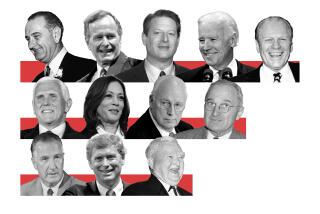Gore Floored in ‘98? Don’t Bet on It
- Share via
The vice president attended all the best schools. His father was a U.S. senator. And although he claimed to be a creature of the common soil of the American South, the aroma of prep schools and Ivy League colleges clung to him and offended his party’s most militant members. Even his military service in time of war could not expunge the image of him as a child of privilege whose attainments had come about more from family connections than honest toil. But the president stood by him in face of all the criticism and said of him, “I don’t think there’s ever been a vice president that has been as much involved in our policy-making and our decisions. . . . He’s been the best.”
The vice president in question is not Al Gore in 1998 but George Bush in 1988. And the dire year-end predictions about Gore’s chances of succeeding President Clinton, prompted by equal portions of media prodding at the nerve endings of a comatose public and the wishful thinking of his envious rivals, will ultimately be as successful in derailing Gore as in scuttling Bush a decade ago.
Both men have been made victims of their privileged backgrounds. Humble origins remain an unquestioned badge of authenticity in American politics, and those born to status and comfort have to struggle to divest themselves of any taint of silk-hat elitism.
Bush’s problem was that in early 1988, he got tagged with being a wimp who had everything presented to him on a silver salver. Some of Bush’s rebuttal--his sterling war record and athletic prowess--were effective in blunting the jibes that emanated mostly from his party’s right wing. Other efforts at ordinariness, such as his professed fondness for fried pork rinds, were transparently implausible.
Gore’s problem is somewhat more complicated. He has adroitly converted his public stiffness and formality into a political plus by the use of self-parody. But this can be two-edged sword in presidential politics where self-deprecation and humility appear less than heroic.
Gore’s most likely rival for the nomination, House Minority Leader Richard A. Gephardt, has attacked from another direction in a manner reminiscent of the followers of Rep. Jack Kemp and the Rev. Pat Robertson snapping at Bush’s heels in 1988. The charge lodged against Gore is that he is an apostate and opportunist who has deserted his party’s most cherished principles by his vocal advocacy of free trade, welfare reform and the balanced budget. Bush, despite his utter fidelity to Ronald Reagan’s brand of Republicanism, was also derided by the true believers as a counterfeit conservative whose commitment to the sacred texts was only skin-deep. This suspicion of Bush had its roots in his statement--impolitic or refreshingly candid depending on your viewpoint--in 1980 dismissing Reagan’s fiscal plan as “voodoo economics.”
Gore faces an additional problem that Bush never had to confront: the lingering accusations of impropriety over fund-raising in the 1996 presidential campaign. Even the recent vindication of Gore by Atty. Gen. Janet Reno--known to be no pal of the vice president’s--has not laid the issue to rest. Campaign finance laws certainly were violated in the case of the Buddhist nuns’ contributions and the conversion of “soft money” to “hard money” by the Democratic National Committee, but there is no evidence that Gore knew of either violation. As for Gore’s telephone solicitations running afoul of the 105-year-old Pendleton Act, passed in the wake of President Garfield’s assassination to protect civil servants from being dunned by politicians, he might as plausibly be prosecuted for fraud for boasting to reporters that he was the model for the hero of “Love Story.”
Most of the attacks on Gore are simply the ration of grief that any front-runner can expect. Some of the anointed with the fortitude to weather the storm, like George Bush, end up the nominee; others, like Edmund S. Muskie in 1972, stagger and collapse.
But in the attacks on Gore there is more afoot than ordinary backbiting. There is an inquisitional malice behind the implications that he is not a true Democrat. Ironically, it is not because Gore is seen as deviating from the principles of his party’s president, as was George Bush, but for his very fidelity to the president’s new path for the party.
More to Read
Get the L.A. Times Politics newsletter
Deeply reported insights into legislation, politics and policy from Sacramento, Washington and beyond. In your inbox twice per week.
You may occasionally receive promotional content from the Los Angeles Times.










